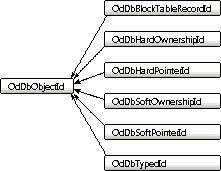
DbObjectId.h
This class implements memory-resident ObjectId objects for OdDbDatabase objects.
Database objects reference other database objects using ObjectId objects, and a database object pointer can always be obtained from a valid ObjectId objects. The effect of this mechanism is that database objects do not have to reside in memory unless they are explicitly being examined or modified by the user.
The user must explicitly open an object before reading or writing to it, and should release it when the operation is completed. This functionality allows the Drawings to support partial loading of a database, where ObjectId objects exist for all objects in the database, but the actual database objects need not be loaded until they are accessed. It also allows database objects that are not in use to be swapped out of memory, and loaded back in when they are accessed. ObjectId objects are not written out to a DWG/DXF file. If a reference must be preserved to a database object that has been serialized, the object's database handle (OdDbHandle) should be used.
Corresponding C++ library: TD_Db
|
|
Name |
Description |
 |
This is the overview for the OdDbObjectId constructor overload. |
|
|
Name |
Description |
 |
The null ObjectId object. |
|
|
Name |
Description |
 |
Binds the specified object. | |
 |
If this ObjectId object has been redirected from another database (possibly an Xref), this function returns the actual ObjectId object for that database. | |
 |
Returns the database with which this ObjectId object is associated. | |
 |
Returns the database handle of the object referenced by this ObjectId object. | |
 |
Returns the database handle of the object referenced by this ObjectId object. | |
 |
Returns true if and only if this object associated with this ObjectId object is erased, or any of its ownership hierarchy have been erased. | |
 |
Returns true if and only if the object associated with this ObjectId object is erased. | |
 |
Returns true and only if this ObjectId object is null. | |
 |
Returns true and only if this ObjectId object references a valid object. | |
 |
| |
 |
| |
 |
This is the overview for the openObject method overload. | |
 |
Returns the original database with which this ObjectId object is associated. | |
 |
Opens the database object associated with this ObjectId object, in the specified mode, or throws and exception if unsucessful. | |
 |
Sets this Object ID to null. |
|
Copyright © 2002–2021. Open Design Alliance. All rights reserved.
|